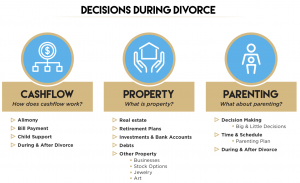Divorce in Connecticut – Who Gets What?

So, you’re wondering who gets what in a Connecticut divorce.
If you boil it down, Connecticut divorce courts help couples decide three main things in a divorce.
- How and whether money will flow (think alimony and child support).
- How custody and parenting will work.
- How property will be divided.
Today we will talk about how property is divided in Connecticut — or “who gets what” in the divorce.
Who Gets What in Connecticut Divorces?
The most common misconception out there is that property gets divided 50/50 in Connecticut. In fact, there is no default that property must be divided 50/50.
Connecticut is an equitable distribution state, and an “all property” state, which means that the courts have jurisdiction over all the property that both spouses have, marital and separate. Equitable does not mean equal, or even half, but rather what the Superior Court considers fair.
Connecticut’s version of equitable distribution looks a great deal different from other states that follow the equitable distribution rule of property division.
So Then How Does Property Division Work in a Connecticut Divorce?
When it comes to marital property, Connecticut is an equitable distribution state. This does not mean that the property is split 50/50 between spouses. “Equitable” property is divided fairly between both spouses, and “fairness” could dictate that one of you gets more than the other.
When dividing up the marital property, several different factors are taken into consideration. They include but are not limited to:
- How long your marriage lasted
- The reasons why the marriage came to an end
- The respective ages and health condition of each spouse
- The current income, occupation, and employability of each spouse
- The personal assets and liabilities of each spouse
- The ability of each spouse to be self-sustaining
- The contribution that each spouse made to the acquisition, maintenance, or appreciation of marital assets
Read: How Does Property Division Word in a Connecticut Divorce?
What Property Can Be Divided in a Connecticut Divorce?
Connecticut differs from many other states in the way that it regards property and ownership rights. When spouses divorce, practically all property is subject to distribution. This is because Connecticut is an “all property” state and doesn’t follow a separate vs marital property distinction.
Property subject to division in Connecticut includes:
- Property that each spouse acquired prior to the marriage
- Property in the name of one spouse only
- Inheritances and gifts
Read: What Is an “All Property” Divorce State?
The Comprehensive Connecticut Property Division Guide
How to divide property is one of the most important issues in divorces. And, it’s one of the most confusing. There are no set formulas or rules on how property will be divided. The good news is that creates tremendous flexibility for experienced divorce attorneys to craft an individualized approach. In order to prepare to make solid and informed decisions, you need to understand how property division works. Our Comprehensive Connecticut Property Division Guide tells you everything you need to know about property division in Connecticut. Read: Property Division: The Comprehensive Connecticut Guide
Next Steps
Now that you have learned how property division works in Connecticut, you know that it isn’t simple — which means there is a lot of opportunity for creative negotiations, strategy, and solutions. It’s important to have an experienced divorce legal team as your guide.
Our first step at Freed Marcroft, the Goals & Planning Conference, is designed to get to the heart of your problem and unveil your true goals. Then, we take those goals along with the facts of your case and analyze them so that we can present you with recommendations and options on how to move forward.








